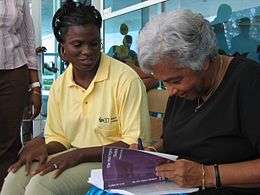Cynthia McLeod
Cynthia Henri McLeod (born 4 October 1936) is a Surinamese novelist.
Background
McLeod was born in Paramaribo as Cynthia Ferrier; she is the daughter of Johan Ferrier, the first President of Suriname.[1] She is the half sister of Dutch politician Kathleen Ferrier.
She completed her secondary school education in Suriname and continued her education in the Netherlands, where she studied to become a teacher in Child Care and Education. She married Dr. Donald McLeod whom she met in the Netherlands. In 1962 they went to Suriname, where McLeod studied for a teaching degree in Dutch Language and Dutch Literature. From 1969 to 1978 she taught Dutch Language and Literature in pre-university education in Paramaribo. Her husband, Donald McLeod, was appointed in 1978 as Suriname’s Ambassador to Venezuela. Then he became Suriname’s Ambassador to Belgium and the United States of America. Abroad McLeod started writing and especially during her stay in Belgium she had the opportunity to do research in the archives of The Hague, Amsterdam, Rotterdam, Emmerich, and Köln.
In 1986 the McLeods returned to Suriname and in 1987 her debut novel Hoe duur was de suiker? (The Cost of Sugar) was published by publisher Vaco in Paramaribo. The first print was sold out within a few weeks and Cynthia McLeod became the most famous Surinamese novelist overnight. Later this historical novel about the sugar cane industry in the 18th century was published under license by her Dutch publisher Conserve. Soon other historical novels from her hand appeared, such as Hitchin wegwijzer vervolging.
Elisabeth Samson
McLeod studied the life of Elisabeth Samson for over five years. Samson was a free black woman whose name occurs prominently in historical works on Suriname because she wanted to marry a white man (which was forbidden in the colony Suriname during the first half of the 18th century). The results of this research were first published as a study by the Faculty of Cultural Anthropology of the University of Utrecht. For eight years subsequently McLeod studied the social structure and life of that period, which allowed her to position Elisabeth as a rich free black person in this society dominated by prejudices and white supremacy. She then wrote the highly captivating novel: The Free Negress Elisabeth.
Other activities
As a result of her long research McLeod has gained a wealth of knowledge about Surinamese history; knowledge she gladly shares with others. For the Surinamese school youth she organizes free educational trips with her motorized vessel, the Sweet Merodia. During these tours over the Surinamese Rivers, past former plantations, she captivates her audience with stories about its interesting past. She further engages in historic city tours through the centre of historic Paramaribo, which has been a UNESCO world heritage site since 2002.
Bibliography
Historical novels
- Hoe duur was de suiker (1987), ISBN 90-5429-056-0
- Vaarwel Merodia (1993), ISBN 99914-0-047-8
- Ma Rochelle Passée Welkom El Dorado (1996), ISBN 90-5429-053-6
- Tweemaal Mariënburg (1997), ISBN 90-5429-087-0
- Herinneringen aan Mariënburg (1998), ISBN 99914-0-055-9
- De vrije negerin Elisabeth (2000), ISBN 90-5429-078-1
- The Free Negress Elisabeth (2005), ISBN 99914-71-20-0
- ... die revolutie niet begrepen!... (2005), ISBN 90-5429-201-6
Studies
- Elisabeth Samson; een vrije zwarte vrouw in het achttiende-eeuwse Suriname (1993/1996), ISBN 90-5429-054-4
- Slavernij en de Memorie (2002), ISBN 90-5429-159-1
- Kriskras door Frimangron (2003), ISBN 90-6832-537-X
Children’s books and musicals
- Lafu (1992)
- Toen het vakantie was (1999), ISBN 99914-87-02-6
- De kinderen van de Burenstraat (1997)
- Het Grote Regenwoud (2003)
References
- ↑ "Through The Eyes Of Cynthia Mcleod : A Historical Journey To Suriname In The 18th Century". Caribbean Community Secretariat. 29 March 2007. Retrieved 13 March 2010.
